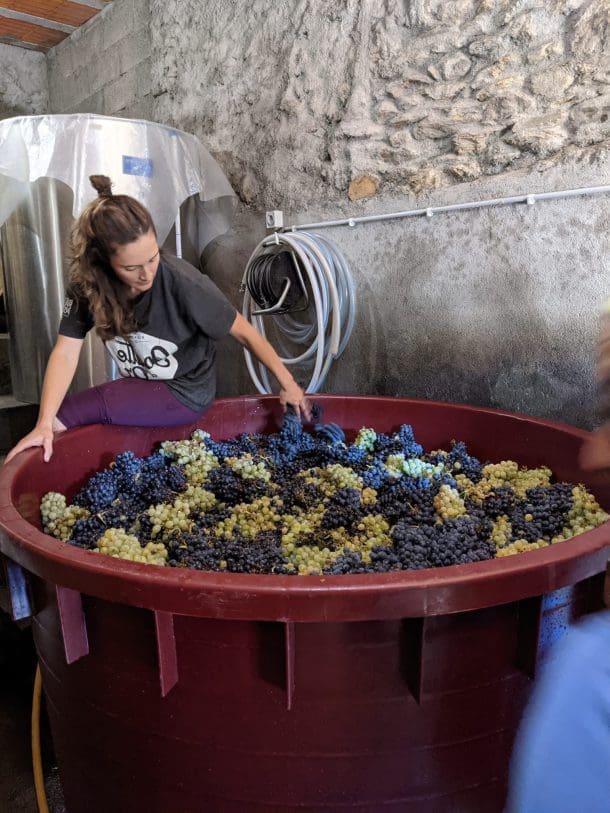In 2017, Aline Domingues founded Menina d’Uva. This natural winemaking project resides in the village of Uva, situated in the Planalto Mirandês region. It is part of Trás-os-Montes near Portugal’s northeastern border with Spain. Born in Paris, Aline pursued studies in biology and specialised in fermentation processes. She had a strong passion for winemaking and a desire to connect with her ancestral roots. This led her to move to Uva, where she began revitalising old vineyards. She produces natural wines, which reflect the unique terroir of the region.
Rooted in Tradition and Terroir
The Caribbean Housewife is excited to introduce the cuvées of Aline Domingues to pair with our Sabor & Saudade menu. Her vineyard Menina d’Uva means “The Girl from Uva” in Portuguese and consists of approximately 3 hectares of old vines with ages from 40 to 100 years. They encompass a diverse range of traditional grape varieties native to the Planalto Mirandês. Menina d’Uva is mainly situated at an altitude of 550 meters and has one vineyard for the Urç wine at 750 meters. The grapes thrive in a continental climate with cold winters and hot summers. Aline practices natural viticulture. She utilises compost to nourish the soil and abstains from chemical treatments. A choice facilitated by the region’s arid conditions.
 Essence of the Planalto Mirandês
Essence of the Planalto Mirandês
Aline Domingues uses minimal intervention techniques, such as spontaneous fermentation with indigenous yeasts, foot treading, and manual pressing with a wooden vertical press. The wines are aged primarily in neutral vessels: stainless steel, fiberglass, used or cement barrels, with minimal sulfites. There is no fining or filtration.
The continental climate is extreme: from hot and dry summers to long and cold winters. This shapes the character of her wines. It creates a natural tension between ripeness and freshness. Aline co-ferments white and red grapes. She works with whole clusters and uses minimal extraction to preserve the purity of the fruit. Every bottle is a true reflection of the land.
Distinct Character and Variety
Menina d’Uva offers a variety of cuvées. Each showcases the distinct characteristics of the region’s grape varieties and terroir.
The 2023 vintages are:
ANCESTRAL
A sparkling Pét-Nat rosé produced from a field blend of native white and red grapes (60%-40%), sourced from different plots of 60- to 80-year-old vines, grown in clay soils. Over 15 native varieties, primarily Tinta Gorda, Malvasia, Bastardo Preta and Branco, Formosa, and Verdelho. Whole bunches are foot-trodden and directly pressed, with fermentation occurring in stainless steel tanks. The fermentation is finished in the bottle, naturally producing gas and sediment, resulting in effervescence. After six months of aging, the wine’s final stage is expelling the sediment using the ancestral dégorgement method.
Tasting Notes Lively and refreshing, with notes of green apple, white flowers, and subtle brioche. Fine bubbles carry a zesty acidity, finishing with a crisp, mineral edge.
BRANCO
A direct, vibrant white that captures the raw energy of Planalto Mirandês, created with a mixed field blend of 70% Malvasia and 30% other native varieties Bastardo Branco, Formosa, and Poilta, from different plots of 40- to 60-year-old vines, grown in schist soils. Whole bunch foot-treading and direct pressing. Fermented in cement tanks and bottled young.
Tasting Notes Bright and crisp, with notes of citrus, white peach, and chamomile. A saline finish and firm acidity give it precision and tension.
CISTE
A unique wine style of a field blend with native white grapes (60%) and red grapes (40%), also known as a clarete. Sourced from different plots of 60- to 80-year-old vines, cultivated in clay soils. Over 15 native varieties, primarily Tinta Gorda, Malvasia, Bastardo Preta and Branco, Formosa, and Verdelho. Spontaneous co-fermentation and short maceration of whole bunches for 5 days, followed by foot treading and gentle remontage. Aged in used and fiber barrels. Pressed before the end of fermentation. A textured, mineral-driven wine that embodies the tension between freshness and depth.
Tasting Notes Golden and lightly hazy, with aromas of wild herbs, citrus zest, and stone fruit. The palate is textured yet vibrant, with layers of saline minerality and a long, structured finish.
PALOMBA
A gastronomic red, balancing fruit, structure, and depth, created with a co-fermented field blend of native red grapes: 90% Tinta Gorda and 10% other traditional varieties, sourced from different plots of 40- to 60-year-old vines, grown in schist soils. Whole bunch spontaneous fermentation and maceration for 5 days to achieve its distinct colour, aged on fine lees, followed by foot treading and remontage.
Tasting Notes Pale copper-hued, with aromas of wild strawberries, blood orange, and dried herbs. The palate is fresh yet textured, with a savory finish and a touch of spice.
A portion of the profits from this wine is donated to the Palombar association, a collective based in Uva dedicated to nature conservation and preserving rural heritage.
URÇ
A wild, expressive red with a rustic, yet elegant feel. Made from both white and red grapes (50%-50%) from a single, century-old 0,5-hectare vineyard, grown in granite soil. A blend of over 15 native varieties, primarily Tinta Gorda, Malvasia, Bastardo Preta and Branco, Verdelho Branco and Russo, Tinta Fina, and Tinta Bruñal. Red and white grapes are destemmed and co-fermented in cement tanks. Remontage and foot-treading during fermentation. Pressed at the end of fermentation. Short maceration, aged in neutral barrels.
Tasting Notes Deep ruby-red, with notes of wild blackberry, black pepper, and forest floor. Silky tannins and earthy depth lead to a long, spicy finish.
Through Menina d’Uva, Aline Domingues dedicates herself to preserve and promote the ancient viticultural heritage of the Planalto Mirandês. Her authentic wines embody the essence of the region’s terroir and its traditional grape varieties. We look forward to pairing her wines with our
cuisine.
Resources
Menina d’Uva – Aline Domingues
Portugal / Trás-os-Montes / Planalto Mirandês / Vimioso / Uva
Raisin
Rostos da Aldeia
Vinerra
Photo
Agnes Saaby Thomsen
